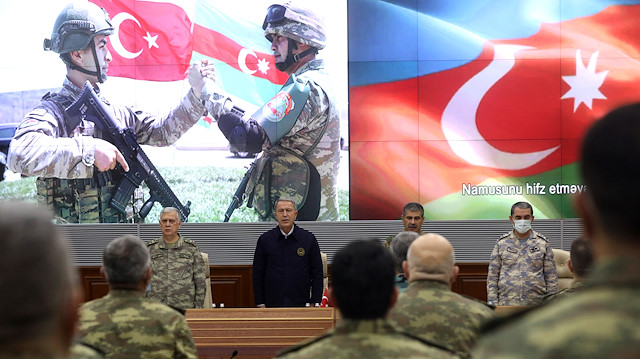
The recent peace deal between Azerbaijan and Armenia has cemented Turkey as a force to be reckoned with in the Caucasus region, long viewed by Russia as its own geopolitical backyard, the Financial Times reported on Thursday.
Russia brokered a cease-fire earlier this week between the two former Soviet states ending weeks of armed conflict.
Azerbaijan had previously looked at Russia as its most important partner, but Turkey’s support for Azerbaijan in the recent military outbreak has led it to reassess its alliances.
The daily quoted Ruslan Pukhov, the director of the Centre for Analysis of Strategies and Technologies, a Russian defence think-tank, as saying: “The geopolitical consequences are disastrous not only for Armenia, but also for Russia.”
"The Russians' client and ally was the loser. The Turkish ally won convincingly,” he added.
Pukhov added: “Behind the thin veil of a deceptive foreign policy triumph, namely successful mediation and bringing peacekeepers to the region, the harsh reality is that Moscow’s influence in the trans-Caucasus region has sharply decreased, while the prestige of a successful and pugnacious Turkey, on the contrary, has grown incredibly.”
Moscow had kept the status quo largely balanced for the past 25 years, but Ankara tipped the scales in favor of Baku in the most recent conflict.
In a speech on Wednesday, Turkish President Recep Tayyip Erdogan said: “The 28-year occupation of lands belonging to Karabakh and Azerbaijan has officially come to an end.”
The Financial Times quoted Onur Isci, assistant professor of international relations at Bilkent University in Ankara, as saying that Erdogan “sees Turkey as a regional power. This is not something he will concede. Turkey will not return to becoming the Nato ally Turkey of the 1950s. I think Turkey is trying to stake out an autonomous path for itself.”
Isci added that Russia and Turkey still have disagreements on geopolitical issues, including Syria, and that while they try to manage these differences, there will not be a “full-blown” military alliance.
Stanislav Pritchin, senior research fellow at the Center for Post-Soviet Studies at the Russian Academy of Sciences, told the daily: “Turkey’s actions [in Nagorno-Karabakh] are partly an answer for Russian activities in the Middle East. Turkey is trying to be a global player and to have a finger in every pie.”
Russia has confirmed that Turkey will be part of a joint centre responsible for upholding the ceasefire, a recognition of Ankara’s status in the Caucuses.
Relations between the ex-Soviet republics have been tense since 1991, when the Armenian military occupied Nagorno-Karabakh, a territory recognized as part of Azerbaijan, and seven adjacent regions.
Fresh clashes erupted on Sept. 27 and ended this week with a peace deal.














